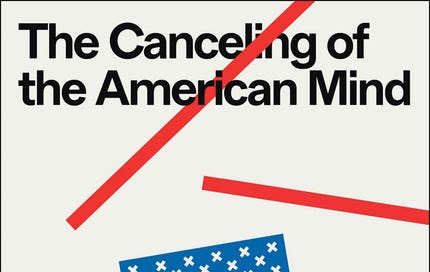Review: The Canceling of the American Mind by Greg Lukianoff and Rikki Schlott
"How Cancel Culture Undermines Trust, Destroys Institutions, and Threatens Us All-But There Is a Solution"
Book jacket for “The Canceling of the American Mind.” | Simon & Schuster
The Canceling of the American Mind: How Cancel Culture Undermines Trust, Destroys Institutions, and Threatens Us All - But There Is a Solution by authors Greg Lukianoff and Rikki Schlott, illustrates how Cancel Culture, which got its start in PC culture, erodes people’s ability to speak and therefore their ability to think. The erosion of speech effectively cancels minds, as speech is an imperative part of cognition.
Another ominous outcome of Cancel Culture is people are being forced to say and do things they do not hold to be true. Lukianoff and Schlott outline many examples in their book that show this in action and recount stories (many necessarily anonymous) where people have found themselves in this situation, including at Yale Law School. What effect does acting dishonestly have on the ability of people in the justice system to mete out justice? The book also shows how ideological screening tools are being used widely in society’s institutions, all the way along the path of high school, post secondary education, certification in professions and into employment. It defies common sense to think that this is not having an impact on every individual that goes through this system and every individual that is touched by this system. Perhaps this is one of the major reasons there is a plethora of anxiety and depression amongst the populace? Humans do not thrive in environments where they are experiencing coercion or when their ideas are not challenged and strengthened.
The book discusses how Lukianoff came to see Cancel Culture’s inherent harms based on his own experience recovering from mental illness. The recovery process helped him recognize unhealthy patterns of thinking and acting. The knowledge he gained helped him identify that people employing Cancel Culture’s proscribed way of treating people, situations, businesses and institutions they want to target are acting in a manner that is unhealthy at best and harmful at worst. The authors develop this idea by presenting the concepts “rhetorical fortress” and “efficient rhetorical fortress”, used respectively by the political left and the political right. Each fortress is built out of a set of ways to cancel those in the perceived outgroup.
The authors note that despite the very human natural tendency to cancel, call out, and to form in and out groups; nevertheless, society in the western world has developed due to strong foundations around freedom of speech, academic freedom and intellectual freedom. The right to say what’s on a person’s mind, study what’s on anyone’s mind and to read what each person wants to. There has been a strong free speech culture, but that is wavering. Lukianoff and Schlott call for everyone to reinvigorate a free speech culture in order to preserve democracy and continue on the enlightenment path. American minds must be free in order for Americans to remain free. Authoritarianism is creeping (or leaping) into society and must be countered in earnest by everyone in order to keep it at bay.
To promote viewpoint diversity, Heterodoxy in the Stacks invites constructive dissent and disagreement in the form of guest posts. While articles published on Heterodoxy in the Stacks are not peer- or editorially-reviewed, all posts must model the HxA Way. Content is attributed to the individual contributor(s).
To submit an article for Heterodoxy in the Stacks, send an email with the article title, author name, and article document to hxlibsstack@gmail.com. Unless otherwise requested, the commenting feature will be on. Thank you for joining the conversation!




It's intriguing to me that the two co-authors are of two different generations (and I believe they remark on this in the book's preface or early chapters), yet they have general convergence of perspectives on how cancel culture works, in both its more blatant and insidious forms. Schlott is maybe a real departure for Gen Z but that may also be a big generalization on my part--but her own experience made her question much of what she saw around her in more than one institution and setting.
I have seen more than survey showing less respect for liberal democratic norms associated with Gen Z but other evidence suggests that. may be more intergenerational as well. (Other than with Baby Boomers . . . . . ). Restoring liberal democratic norms looks crucial in restoring in what the authors call a "free speech culture."
Relatedly, "cancellation" can obviously take a variety of forms, including the social ostracism that's less remarked on or less obvious. It's the widely reported self-censorship that becomes a form of self-cancellation, in a way, in some settings--and the expectation for conformity.